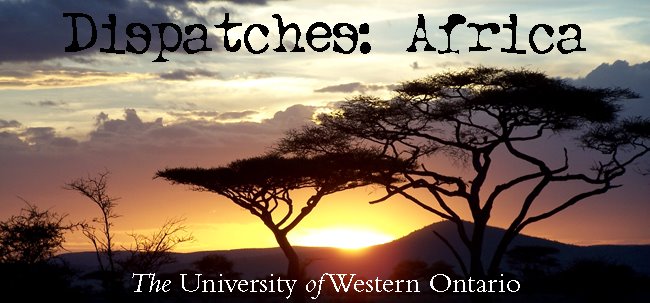 Mwanza, Tanzania - Arriving in Mwanza, Tanzania this afternoon following yet another travel day (that makes five straight days on planes), we are finally able to shed our wings for a few and settle in one place. Upon arrival, we were met at the airport by the Western Heads East’s project’s current interns, Meaghan and Alison, and taken to Hotel Tilipia, on the banks of Lake Victoria. We were even greeted by birds the size of small adults, nicknamed “Dirty Birds” around here. I thought they were statues they were so big. Statues don’t move, though.
Mwanza, Tanzania - Arriving in Mwanza, Tanzania this afternoon following yet another travel day (that makes five straight days on planes), we are finally able to shed our wings for a few and settle in one place. Upon arrival, we were met at the airport by the Western Heads East’s project’s current interns, Meaghan and Alison, and taken to Hotel Tilipia, on the banks of Lake Victoria. We were even greeted by birds the size of small adults, nicknamed “Dirty Birds” around here. I thought they were statues they were so big. Statues don’t move, though.Taking in the sights from the air has its unique benefits and can give provide perspective about just how big things are, how the topography and climate change and how dense populations are. From what we have seen so far here, it’s mostly: very vast, predominantly arid and home to geographically diverse peoples.
We had a pretty clear day for flying and got a good look at Mount Kilimanjaro, where we landed to pick up additional passengers (I’m gathering Precision Air functions a bit like a big city bus…), the Ngorongoro crater and the Serengeti. There was also volcanic activity below as a volcano bordering the crater had begun spewing ash.
Seeing small vortexes of dust curling violently into the sky like wagging fingers, it was amazing to see just how dry and dusty everything is. I had believed the plumes were smoke from campfires, but as I watched them dance through the brush as the winds changed, it became apparent they were something else entirely. It was also particularly interesting to see homesteads on the savanna set up with circular or square fences of planted brush to keep wild predators away. Likely a good thing when you live in these parts in a mud hut. Small sections were portioned off with additional brush fences for gardens or for goats, and in the inner circle – with the most security – were the owners’ homes.
Prior to bidding kwaheri to Kenya this morning, we had an early meeting with Nyambura Gigthagui from The World Bank, who looks after funding for this probiotic yogurt project in Kenya. She warned of the importance of moving quickly to prevent any loss of momentum, and to also ensure that any community kitchens set up are wholly owned by the women’s groups rather than any one individual. “At the community level, we have so many resources available, but we need a framework for decentralizing them,” she said. Hopefully – and I believe we do – we have a positive way in which we can encourage these groups to take ownership and use their learnings to provide significant benefits to their communities.
The dust in the air has coated the interior of my lungs, bringing with it a slight hacking cough not helped by the long days nor the pollution in the cities, but none of us can believe we have been here for only three days.


No comments:
Post a Comment